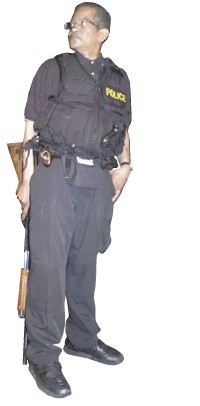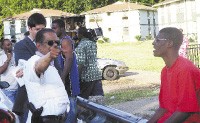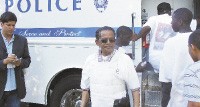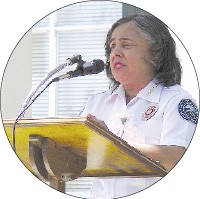On July 4, 2005, Frank Melton became mayor of Jackson, Mississippi. In his first year in office, he has become a lightning rod for controversy. The Jackson Free Press, that city’s alternative newspaper, put it this way: “Soon after Melton walked into the mayor’s office, the press was on its toes. A new, brash personality had taken up residence. Melton enjoyed donning police-issue bullet-resistant vests, brandishing weapons, and wearing a gold badge and the distinctive backward cap that became a trademark for early nighttime news footage of him leading “raids” for the cameras.
There was no denying it: Melton wanted to be a cop, and he hired a nice, doe-eyed police chief who allowed him free rein over nightly police activities. Melton spent his first night in office joining police checkpoints and “knock and talks” at hotels along Highway 80. The press treated this as spectacle, with cameras trailing the new mayor as he strutted about like a law enforcement officer. While some individuals grew concerned about separation of powers, many Jackson residents were thrilled with the new attention, and cheered Melton for his hands-on behavior … ”

But the cheering soon turned to concern as more facts became known about the mercurial Melton. He often preferred telling a good story to the truth. As the media began fact-checking Melton’s statements and background, they learned the mayor had a thin skin, as well.
Soon after he was inaugurated, the Jackson Free Press broke the news that Melton had lied in a civil lawsuit against him for actions while he was head of the Mississippi Bureau of Narcotics (MBN), and the lie has popped up time and again as events in the suit proceed. Former MBN pilots sued Melton for defamation after he leaked a memo to the Jackson Clarion-Ledger in 2003 alleging their misconduct. Melton, a former television executive, denied leaking the information then later tried to use the obligation of reporters to protect their sources in defense of his denial without mentioning that he was the source. Melton’s lie infuriated Lauderdale County Circuit Court judge Robert Bailey, who backhanded the new mayor by awarding the plaintiff’s argument to strike Melton’s defense from the record, essentially handing Melton an instant loss. The next phase of the case involves a jury deciding later this year how much Melton will have to pay.
One of Melton’s first acts when he took office was to close the Terry Road Bookstore. Melton told WLBT-TV that police had witnessed illegal sex in the back of the store. WLBT quoted Melton saying, “I came in with two detectives, and there were two men in a sex act.”
Melton’s account differed from that of Sergeant William Gladney of the Jackson Police Department vice crimes unit. “I don’t know what happened before I got there,” Gladney said. “We arrested [cashier] Debra Washington, but I don’t know about the two men.” The mayor’s spokeswoman said later that no arrests for public sex had been made on that date.
The mayor tried to use the same “gotcha” strategy at another adult bookstore in South Jackson in November 2005. Within the week, Melton was proclaiming that he’d caught people in a sex act during his visit. But the store’s owner produced surveillance tape of Melton’s visit that proved that no customers were in the story during his “raid.”
Melton told both the Clarion-Ledger and the Jackson Free Press that he is a certified police officer, though no records in Mississippi back up his claim — and it has no merit, according to state attorney general Jim Hood.
The mayor also regularly told the press that he is certified to carry firearms, which he enjoys wearing to City Hall and countless other places, including locations where guns are prohibited by state law — despite no record indicating that this certification exists.
And so it has gone. Melton makes a statement; the media check it out and find it to be untrue. But he’s continued his one-man battle against crime, even declaring a “state of emergency” for the city on June 23rd after a week of higher than usual criminal activity.
On June 28th, Jackson Free Press reporter Brian Johnson accompanied Melton on one of his nightly patrols. His remarkable story follows. — Bruce VanWyngarden
Punks and Heavy Artillery
Mayor Frank Melton, clad in a brilliant-white bullet-resistant vest and wearing a sidearm, invited members of the media to join him in the hunt for Vidal Sullivan, who has become the object of an intense manhunt on two charges of kidnapping and one of aggravated assault. Sullivan is also suspected in a shooting on June 9th.

Jackson Free Press reporter Brian Johnson on patrol with Mayor Melton
A cameraman from WAPT-TV, Richard Fausset of The Los Angeles Times, and I boarded the Mobile Command Center (MCC), and then we thundered out of the compound with four police cruisers and three media cars in tow. The cruisers swept in from the left and right, their blue strobes flashing, as we penetrated to the Kroger on I-55 for water and soda.
Our next stop was a public park, where we met members of a lawn crew Melton has created to provide disadvantaged youths with jobs. Earlier that day, Melton acknowledged that two members of the lawn crew were arrested for missing a court appearance on armed robbery charges. Melton asked the teenagers how many lawns they had mowed that day. “Twenty-seven,” one of them replied. All 12 youngsters boarded the MCC and crowded into the back to watch movies on a large plasma screen. Melton said he has 230 young men working for the city.
From there, we rolled to Wood Street, hot on the trail of Vidal Sullivan. In February, Melton said he was considering a leave of absence to apprehend Sullivan, who had just been acquitted of murder in the February 2003 death of Carey Bias. Melton said he would bring new charges in a separate case against Sullivan. When Sullivan turned himself in to Melton on March 2nd, Melton took him into “protective custody.”
“He’s back on cocaine,” Melton told us, as the MCC pitched and heaved over every bump in the road. “We have kept a close eye on him. Either [Police Chief] Shirlene [Anderson] or me calls him every day, making sure he takes care of himself.”
Melton earlier told the Free Press that he had given Sullivan money in May to buy school clothes for his 10-year-old son; thus, the reason Sullivan was spotted in City Hall.
The mayor met with a small group of young men and walked 40 feet down the road with one of them, Maurice Warner, who Melton says he helped raise and who was also acquitted in the Bias murder. The two men embraced. I wasn’t close enough to hear everything, but as Warner wiped tears, he begged loudly, “Just give me an hour!” Melton held Warner loosely throughout their conversation.
Back in the MCC, Melton said Warner was going to try to convince Sullivan to surrender. He said we would be there when he took Sullivan into custody — as he often helps “bring in” wanted men to law enforcement.
We stopped at a housing project in West Jackson. Melton was familiar with the residents and the state of the property. He noted with approval that trash had been removed, but he was irritated that basketball goals had not been mounted as he had instructed. He questioned residents in detail on the algae-clogged concrete creek running through the center of the complex. “Mosquitoes are going to breed in that, and there’s a lot of children out here,” Melton admonished.
An elderly African-American woman in a loose summer dress complained about a white police officer who she claimed was rude and failed to take their calls seriously. Melton told the woman to contact Chief Anderson with complaints about the police.
When we pulled up in front of a group of African-American teenagers and young adults standing in an open stairwell, some of them disappeared behind apartment doors, though most stayed out to greet the mayor, many of them young children. The walls were covered in graffiti, including several tags from the Vice Lords gang. The mayor asked the children to hug him, and most did so in delight. Melton then pulled aside a young man who I will call “Anthony” and escorted him away from the crowd. Fausset and I followed, facing Melton and Anthony, observing their conversation. Anthony, who said he was 18, stared at the ground and hung his head.
“Have you been smoking marijuana tonight?” Melton asked.
“Yes sir,” Anthony mumbled. “About an hour ago.”
“Was it a joint or a blunt?”
“A blunt,” Anthony replied.
Melton then asked Anthony how long he had been smoking (two months) and whether he needed treatment (no). When Melton heard that Anthony had dropped out of high school in his junior year, he was indignant. “You mean to tell me no one from the school, no teacher, no counselor, no one came to ask why you weren’t in school?”
“No sir,” Anthony muttered. Melton then gave the boy his home number and urged him to call for a job. Anthony was clearly uncomfortable, staring at the ground and mumbling in a faint monotone, like a child before a stern father. If either Melton or Anthony had asked for privacy, I would have stepped away, but one reason why I am concealing Anthony’s identity is that he really had no way to say no to anything.
We walked back through the stairwell, and Melton chided, by name, some of the people who had since emerged from behind closed doors. “This is true community policing,” Melton declared. “Get out there and see the people yourself.”
Soon, we stopped in the middle of the street in a neighborhood in West Jackson. The police blocked off traffic and then let cars through in a single lane. They checked the IDs of most drivers and then waved them through. I could not see the use of this spot roadblock, as no police officer seemed to be running license numbers or names on the radio. Many cars turned onto side streets as they approached the roadblock, probably just to avoid the hassle. Most of the drivers who did approach the roadblock were apparently returning home from work.
While the police checked IDs, Melton joined a group of young African Americans. “This one’s a dope dealer,” Melton said, grinning as he clapped one young man on the shoulder before pointing at another, “and this one’s a dope smoker.” I later asked the mayor if he was joking, and he said he was not.
“If I ever got in trouble, in a real tight spot, this is where I would go,” he said. “I know what these boys are capable of, and I trust them with my life.”
Then one of the teenagers showed the mayor the latest issue of the Jackson Free Press, with an illustration of Melton on the cover bursting out of a birthday cake and the headline “Sex, Lies and Videotape.”
“What is this trash?” Melton thundered. He tore up the paper and threw it on the ground. “How can you let children see this sort of trash?” Melton shouted at me.
“I don’t see what’s trashy about it,” I replied. “It’s just the title of a movie.”
“Well at least you’re honest,” the mayor replied. “But I’m going to tell you this. You are cut off. I have tried and tried to work with you people, but after tonight, it’s over. Y’all are going to be out of business in six months.”
Melton berated me about the cover for a full minute, with the crowd from the neighborhood and media from television and print gathered around. A cluster of quizzical police officers listened from the periphery. The mayor seemed to take our cover as a personal betrayal. Finally, he stormed away, and I straggled back to the MCC, careful to keep my distance.

Mayor Melton on Patrol

Mayor Melton on Patrol

“Hey,” an officer in body armor with a pistol strapped to his leg said, “you’re pretty tough.”
I laughed, not entirely convinced. “Thanks.”
I stayed in the back of the bus with the teenagers for a while, to avoid the mayor’s wrath. We stopped to meet with another informant in the hunt for Sullivan, but something was wrong. Melton said loudly, “This is about the fourth time I’ve had to pick [Sullivan] up. I don’t want to have to kill this boy.”
We pulled onto the interstate, police cruisers darting in front of us to clear traffic. In the back of the MCC, the teenagers were watching Black Hawk Down on the plasma screen. Blue strobes from the cruisers danced around the walls while the teenagers watched Army Rangers in Mogadishu fire rockets into buildings and rifles into crowds of gun-toting Africans.
“More skinnies!” the soldiers shouted.
“You really don’t have to use the foot straps on those helicopters,” the police officer told the teenagers. They all stared at him enrapt. He told them what it was like to fire heavy weaponry.
The only thing that excited the teenagers more came much later in the evening, when Melton conversed with a transvestite in a tank top, a miniskirt, and an ill-fitting wig of platinum curls. When I got back aboard, the teens could hardly contain their excitement. “Did you see that?” one of them asked. “That was a punk!”
We stopped near Union Station, downtown, and approached a group of homeless African-American men who were talking out in an empty lot, sitting on the edge of a ruined concrete foundation. At every stop, the other media hung back and talked among themselves while Fausset and I followed Melton.
The mayor sat among the men, who seemed pleased to welcome him. Melton asked the men their names and how long they had been homeless. He asked them if there was anything he could do to help and wrote down numbers for them to contact. Then Melton’s voice took on passion. “I need you men to help me figure out how we can help you. I am determined to help you.”
The men told Melton what they needed, which was shelter, rehab and job training, and Melton listened carefully.
“Hey,” one of the police officers said, patting me on the arm, “y’all are popular.” He pointed at a man in a torn jacket who was reading the new issue. “Even the homeless read you.”
“You know,” Melton said to the men, “sometimes I think I would love to trade places with you. Not to have any worries.”
The men laughed kindly. “You don’t know what it’s like out here, Frank,” one of the homeless men said.
“I mean you don’t have to worry about nonsense like the IRS or the media,” Melton said, looking at me.
“You gotta spend a night out here, Frank. I don’t think you could do it.”
“Oh yes, I could. Hey, Recio,” Melton called to one of the men. Recio approached warily. “These men say I should stay out here with them some night.”
Recio made a face like he had just bitten down on a lemon.
“All right, gentlemen,” Melton said. “I want you to take care of yourselves.” He then signed autographs for several of the men.
As we walked back through the overgrown lot, the wreck of the King Edward Hotel prominent on the skyline, Melton took me aside. “I want to apologize for before,” he said. “You seem like a respectful young man, and I know it wasn’t you who did the cover.”
“I’m sorry it upset you,” I said. “You should talk to Donna [Ladd, publisher of the Jackson Free Press] about it.”
“It won’t do any good,” he said, shaking his head.
I was already exhausted, with hours of raids still ahead. We stopped and questioned many youths who were out past the “emergency” curfew but who all claimed to be 18. We approached porches that smelled of marijuana, and the police searched the ground for evidence while Melton chatted amiably with residents, urging them to find steady work and to take care of themselves. The only arrest of the night was one African-American male with one rock of crack. Sullivan was arrested three days later — but by U.S. Marshals, not the JPD.
For now, though, there was a moment of peace while Melton talked on his cell phone. Fausset leaned against the MCC while we waited. “Is it always like this?” he asked in amazement.
“Welcome to Jackson,” I replied with weary bravado. “‘Circus’ doesn’t quite do it justice, does it?”
photos By William Patrick Butler




